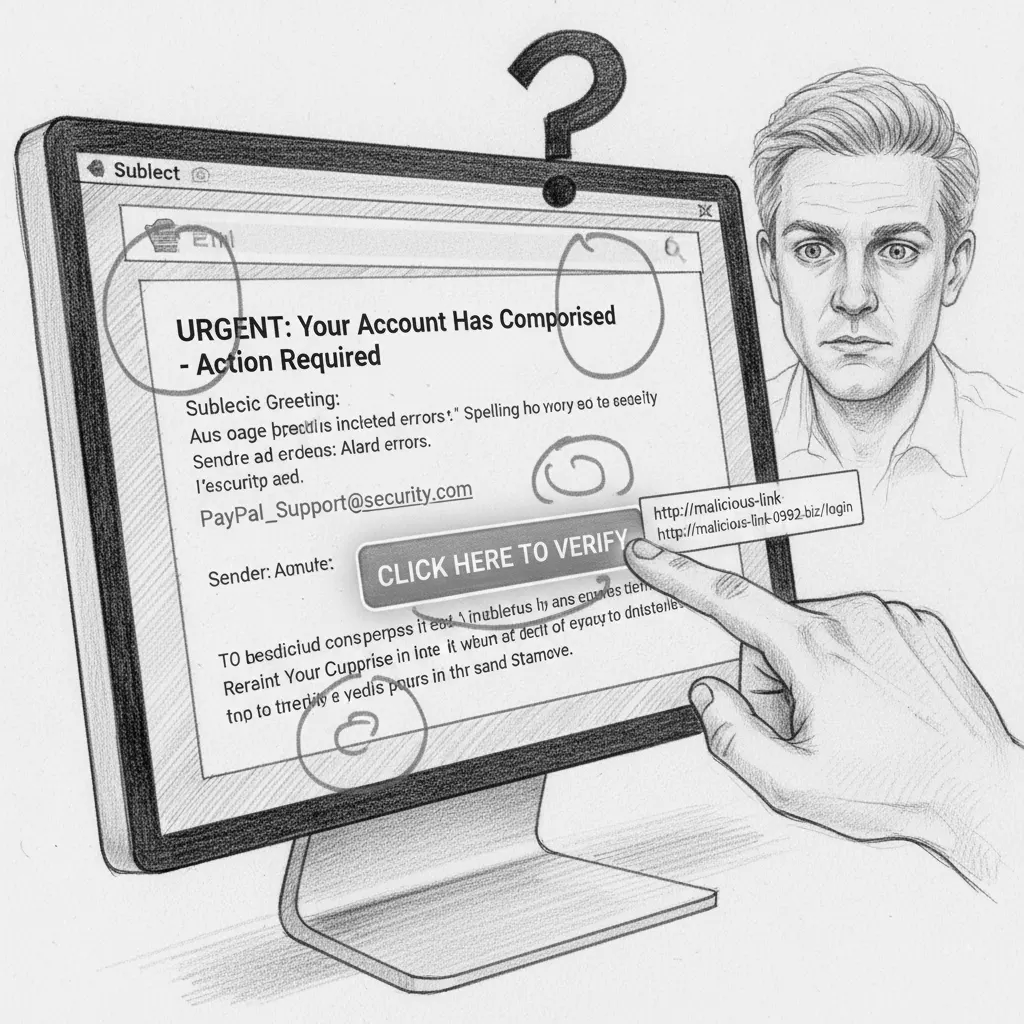Our Website is Still Under Construction (But Our Solutions Are Live!)
We’ve all been there: an email pops up, seemingly important, asking you to click a link or verify some information. But how do you know if it’s the real deal or a clever trick designed to steal your personal information or compromise your business? These “fake emails” are known as phishing, and they’re one of the most common ways cyber criminals try to get to you.
The good news? You don’t need to be a tech wizard to spot them. Knowing a few simple tricks can make you much safer online.
5 Easy Ways to Spot a Suspicious Email
Think of yourself as a detective. Before you click anything, look for these clues:
- Check the Sender’s Email Address – Really Look at It!
- The Trick: Scammers often use addresses that look almost identical to a real company’s, but with tiny changes. For example, “amazon@customerservice.net” instead of “service@amazon.com” or “microsofft.com” with an extra ‘f’.
- Your Move: Don’t just read the name; hover your mouse over the sender’s name (without clicking!) or tap on it on your phone to reveal the full email address. If it looks off, it probably is.
- Look for Urgent or Threatening Language
- The Trick: Fake emails love to scare you into action. They might say your account will be closed, your package is delayed, or you owe money, demanding you “ACT NOW!”
- Your Move: Take a deep breath. Legitimate companies rarely use high-pressure tactics in initial emails. If it feels too urgent, it’s often a scam.
- Spot Generic Greetings
- The Trick: If an email from your “bank” or “Netflix” starts with “Dear Customer” or “Valued Member” instead of your actual name, that’s a red flag.
- Your Move: Most genuine companies personalize their emails to you. A generic greeting suggests they don’t actually know who you are.
- Poor Grammar and Spelling are Big Clues
- The Trick: Many phishing emails come from outside your country or from criminals who aren’t careful. They often contain obvious typos, awkward phrasing, or grammatical mistakes.
- Your Move: Real companies meticulously proofread their communications. If an email looks sloppy, be suspicious.
- Hover Over Links (But Don’t Click!)
- The Trick: The link might say “Click Here to Login,” but it actually takes you to a fake website designed to steal your username and password.
- Your Move: On a computer, hover your mouse cursor over the link. A small box will usually appear showing the actual web address. If that address doesn’t match where you expect it to go (e.g., it’s not Amazon.com, but some jumbled characters), do not click it! On a phone, you can usually press and hold the link to see the full URL.
How Orgmented Protects Your Business from Phishing
Even with the best awareness, everyone can make a mistake. That’s why having robust technical safeguards in place is crucial for any business. At Orgmented, we don’t just tell you how to spot fake emails; we implement customized policies and solutions that act as a strong defense, especially with Microsoft 365 Business.
Here’s how we help:
- Advanced Threat Protection (ATP) for Microsoft 365: We configure and manage Microsoft’s built-in advanced threat protection. This service actively scans incoming emails for malicious links and attachments before they even reach your inbox, often neutralizing threats automatically.
- Safe Links: We enable and customize Safe Links policies within Microsoft 365. If an email contains a suspicious link, Safe Links rewrites it and checks it in real-time when clicked, blocking access to malicious sites even if the email got through initially.
- Anti-Phishing Policies: We set up tailored anti-phishing policies that use AI and machine learning to detect and block sophisticated phishing attempts, including impersonation of your CEO or key suppliers.
- Security Awareness Training Integration: We combine these technical defenses with user training. We can even simulate phishing attacks safely to help your team practice identifying fake emails in a controlled environment.
By combining smart user awareness with powerful, customized Microsoft 365 security features, Orgmented creates a comprehensive shield for your business, keeping you and your data safe from phishing scams. Contact us to find out how we can help you or your business


